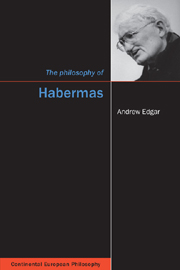2 - The public sphere
Summary
Introduction
In the theoretical essays of the late 1950s and early 1960s, Habermas begins to address the problems of developing a Marxism that is relevant to contemporary capitalism: a “theory of society conceived with practical intention” (TP: 1). While critical of the positivism and instrumentalism that dominated both the natural and social sciences at that time, he was equally critical of the alternatives that were offered by Hegelianism, be it that of Lukács or Adorno and Horkheimer: Lukács's dogmatism leading to authoritarianism; Adorno's negativity leading to a politically impotent quietism. Lukács and Adorno, each in his own way, were criticized for denying the potential of rational debate that, paradoxically, the more positivistically minded Popper recognizes in his account of scientific progress in terms of falsificationism.
Two major empirical studies of this period, Student und Politik and The Structural Transformation of the Public Sphere, begin to substantiate both the critique of contemporary capitalism and an understanding of the potential that it may contain for rational self-criticism and self-transformation. Both studies were initiated within the Frankfurt Institute for Social Research, although neither was published under its auspices. The institute had, throughout its history, produced significant empirical studies including, perhaps most famously, The Authoritarian Personality, but also Studies on Authority and the Family and a study of political attitudes in West Germany, Group Experiment (see Wiggershaus 1994: 149–56, 411–24, 472–8).
- Type
- Chapter
- Information
- The Philosophy of Habermas , pp. 27 - 55Publisher: Acumen PublishingPrint publication year: 2005

